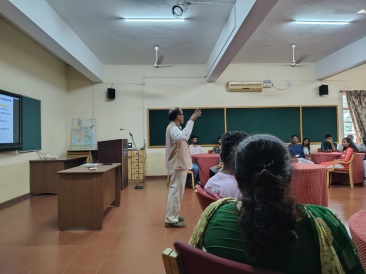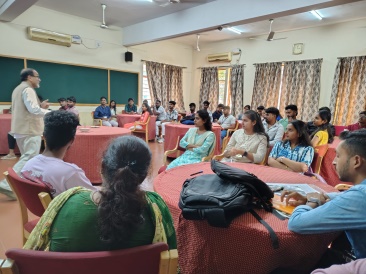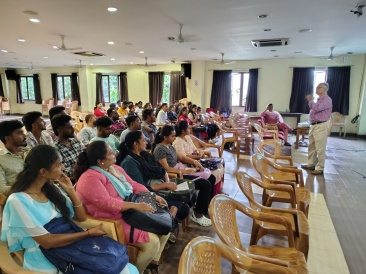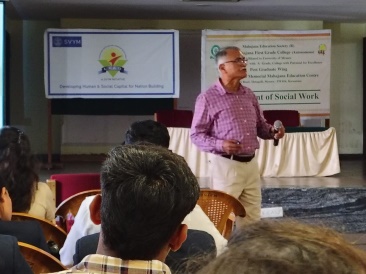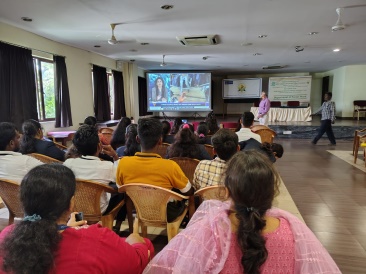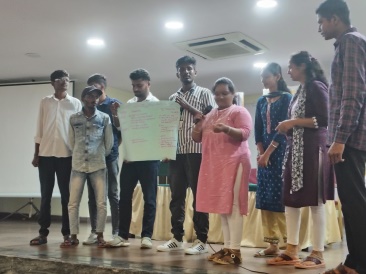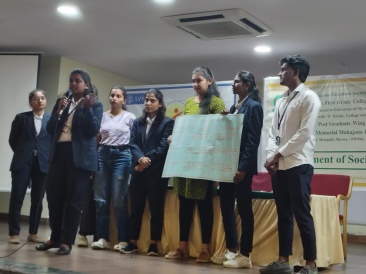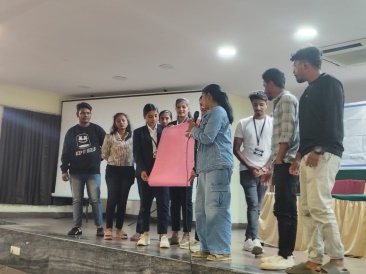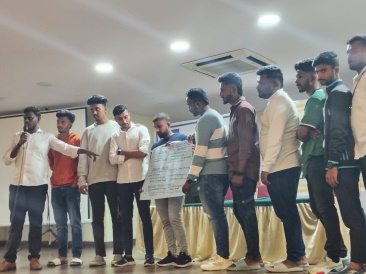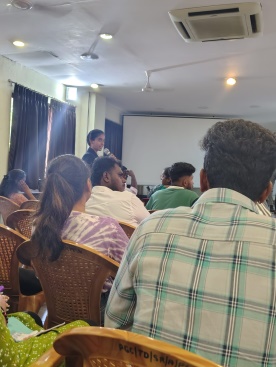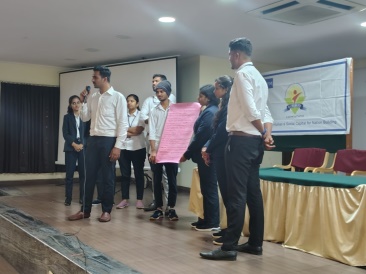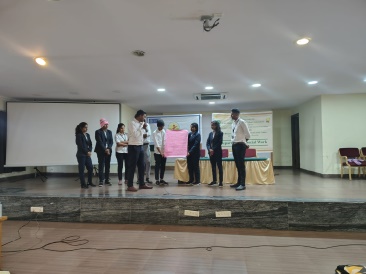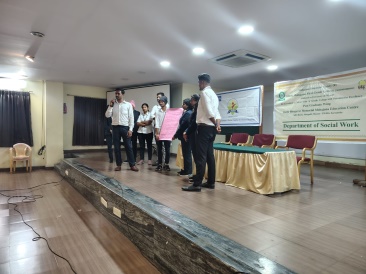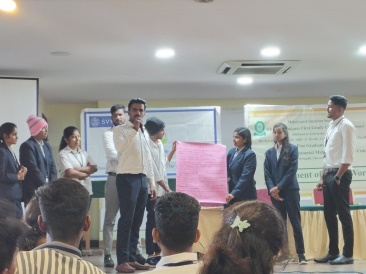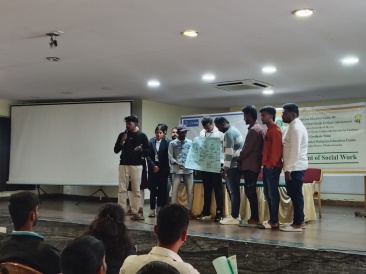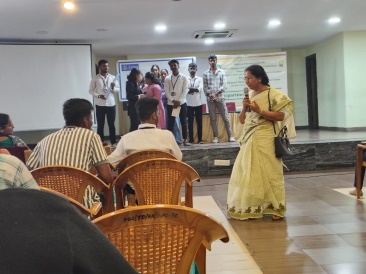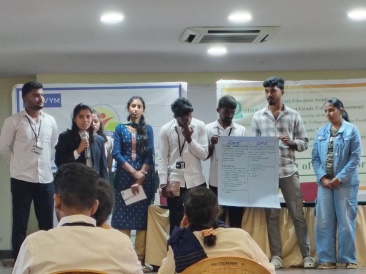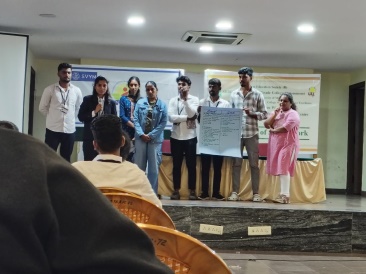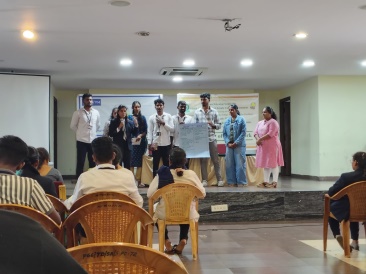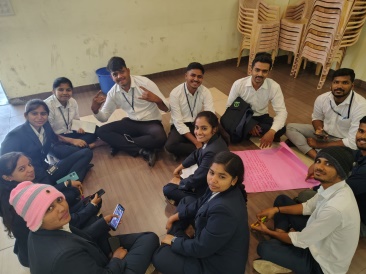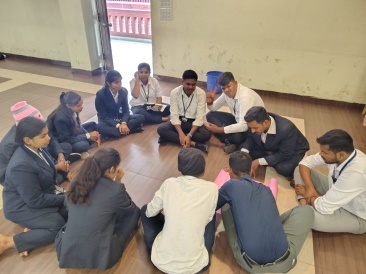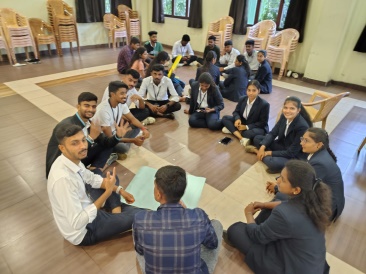SKILL DEVELOPMENT AND EMPLOYABILITY TRAINING FOR SOCIAL WORKERS

SKILL DEVELOPMENT AND EMPLOYABILITY TRAINING FOR SOCIAL WORKERS
21.10.2024 – 23.10.2024
A three-day workshop on “Skill Development and Employability Training for Social Workers” was successfully conducted at the MTA Auditorium of SBRR Mahajana First Grade College, Mysuru. The event, organized by the Department of Social Work in partnership with the Vivekananda Institute of Leadership Development, was aimed at equipping social workers with essential skills to improve their employability and professional competency.
Objectives of the Workshop
The primary goals of the workshop were:
- To enhance skills relevant to the current social work landscape.
- To provide training in understanding Indian society and its social challenges.
- To improve practical skills like CV writing and interview techniques.
- To sensitize participants on critical social issues, including gender equality and human rights.
- To foster leadership and motivational skills among social workers.
Workshop Schedule and Highlights
The workshop was structured over three days, with a mix of presentations, interactive sessions, and hands-on activities led by various experts in the field:
Day 1: 21st October 2024
The first day of the workshop set the tone for the three-day training, focusing on the critical skills required for social workers in the current scenario. It involved both theoretical discussions and practical activities to help participants understand the complexities of Indian society and social challenges. Here’s a detailed breakdown of Day 1:
Session 1: 10:00 am – 11:30 am
Topic: Need for Developing Skills in the Current Scenario
Resource Person: Ms.Dakshayini, Faculty, SVYM, Mysuru
- Objective: This session emphasized the importance of acquiring relevant skills in today’s social work environment. The focus was on how social workers can adapt to the changing dynamics of society and be effective in their roles.
- Content: Ms.Dakshayini discussed the evolving nature of social issues in India, emphasizing how skill development is essential for social workers to make a tangible impact. She highlighted areas such as communication, empathy, conflict resolution, and project management as key skills for effective social work.
- Activity: Participants engaged in a group activity where they identified essential skills required in different social work scenarios. They were divided into small groups to discuss and present case studies, encouraging teamwork and practical application of theoretical concepts.
- Outcome: The session concluded with a discussion on how social workers can continuously develop their skills to meet the demands of diverse communities.
Tea Break: 11:30 am – 11:45 am
Session 2: 11:45 am – 1:00 pm
Topic: Understanding Indian Society
Resource Person: Dr.Rekha, Director, Vivekananda Institute of Indian Studies
- Objective: To provide an in-depth understanding of the structure and dynamics of Indian society, highlighting cultural, social, and economic aspects that influence social work.
- Content: Dr.Rekha offered an overview of Indian society, focusing on its diversity, socio-economic disparities, and cultural complexities. She discussed the challenges faced by marginalized communities and the role of social workers in addressing these issues. Topics included caste dynamics, rural-urban divide, and the impact of globalization on local cultures.
- Interactive Session: Participants were encouraged to share their experiences and observations from fieldwork, fostering a dialogue on how theoretical concepts relate to real-life scenarios.
- Outcome: By the end of this session, participants gained a better understanding of the societal structures that impact their work, enabling them to approach social issues with a more informed perspective.
Lunch Break: 1:00 pm – 2:00 pm
Session 3: 2:30 pm – 4:30 pm
Topic: Women and Child Rights
Resource Person: Dr.Sumathi, Retired Faculty, Fine Arts College, University of Mysore
- Objective: To raise awareness about the importance of women and child rights and the role social workers play in advocating for these rights.
- Content: Dr.Sumathi focused on critical issues related to women and children in India, including gender discrimination, child labor, domestic violence, and the rights of girl children. She highlighted laws and policies designed to protect these vulnerable groups and the challenges in implementing them effectively.
- Group Activity: The session included a group activity where participants were divided into teams to discuss and analyze case studies related to social issues impacting women and children. Each group presented their findings, emphasizing the role of social workers in advocacy and intervention.
- Outcome: This session not only provided participants with a solid understanding of women’s and children’s rights but also fostered critical thinking and problem-solving skills. The activity encouraged them to develop strategies for addressing these issues in their professional practice.
Key Takeaways from Day 1
- Skill Development: Social workers must continually update their skills to stay relevant and effective in a changing social landscape.
- Understanding Context: A deep understanding of Indian society is essential for addressing complex social issues.
- Advocacy and Intervention: Knowledge of rights and legislation empowers social workers to be better advocates for women and children.
- Interactive Learning: The combination of lectures, group discussions, and activities made the sessions engaging and provided a practical approach to learning.
Conclusion of Day 1
The first day of the workshop was a blend of theoretical learning and practical application. Participants left with a clearer perspective on the skills required in the field of social work and a deeper understanding of the societal context in which they operate. The day ended on a positive note, with participants eager to delve into the topics lined up for the next two days of the workshop.
Day 2: 22nd October 2024
The second day of the workshop was focused on practical skills essential for social workers, such as the role of Non-Governmental Organizations (NGOs) in development, CV writing, interview skills, and gender sensitization. The sessions combined theoretical knowledge with interactive activities to ensure that participants could apply the concepts in real-world situations.
Morning Sessions
10:00 am – 11:30 am: NGOs’ Role in Development and Management
Resource Person: Mr.Sudarshan Sharma, Faculty, Vivekananda Institute of Leadership Development and Vivekananda Institute of Indian Studies.
- Session Overview: The morning session began with a comprehensive discussion on the vital role that NGOs play in societal development. Mr. Sharma outlined the structure, functions, and responsibilities of NGOs, emphasizing their contributions to grassroots initiatives, community mobilization, and policy advocacy.
- Key Topics Covered:
* History and evolution of NGOs in India.
* The impact of NGOs on social development, education, health, and environmental conservation.
* Case studies of successful NGO-led projects and their societal impact.
* Best practices in managing NGOs, including strategic planning, resource mobilization, and stakeholder engagement.
* Challenges faced by NGOs in the Indian context, such as funding, sustainability, and policy constraints. - Interactive Activity: Participants engaged in a brainstorming session to identify pressing social issues in their communities that could be addressed through NGO initiatives. This exercise encouraged critical thinking about how to implement and manage projects effectively.
11:45 am – 1:00 pm: Basics of CV Writing and Facing Interviews
Resource Person: Ms. Lakshmi, Manager, Human Resources, Swami Vivekananda Youth Movement (SVYM).
- Session Overview: Ms. Lakshmi conducted an in-depth session on effective resume writing and interview preparation. Her talk was designed to help participants present themselves confidently to potential employers and enhance their employability.
- Key Topics Covered:
* Elements of a well-structured CV: How to highlight strengths, skills, and accomplishments.
* Tips on tailoring a CV to specific job roles within the social sector.
* Common mistakes in CV writing and how to avoid them.
* Preparing for interviews: Tips on presenting oneself professionally, understanding body language, and answering common questions effectively.
* How to research a prospective employer and align one’s experience with the organization’s mission and values. - Interactive Activities:
* CV Writing Exercise: Participants drafted their resumes, focusing on clarity, relevance, and presentation. Ms. Lakshmi provided one-on-one feedback to ensure each CV was professional and impactful.
* Mock Interviews: The participants engaged in role-play, simulating real interview scenarios. Each participant took turns being the interviewer and the interviewee, providing a chance to experience both perspectives. Constructive feedback was provided on communication skills, answering strategies, and professional demeanor.
Afternoon Sessions
2:00 pm – 4:30 pm: Gender Sensitization
Resource Person: Dr.Swarnamala, Associate Professor (Retired), University of Mysore.
- Session Overview: The afternoon session was dedicated to understanding gender sensitization and its significance in social work. Dr.Swarnamala highlighted the importance of recognizing gender biases, promoting equality, and implementing inclusive practices within communities and organizations.
- Key Topics Covered:
* Definition and importance of gender sensitization in the social sector.
* Common gender stereotypes and how they impact both men and women.
* Gender-based violence: Forms, causes, and consequences.
* Legal frameworks in India related to gender equality and women’s rights.
* Role of social workers in promoting gender equality and advocating for marginalized groups.
* Gender-sensitive communication techniques and language. - Group Activity:
* Role-Playing Scenarios: Participants were divided into small groups and given scenarios related to gender issues, such as workplace discrimination, domestic violence, and access to education. Each group acted out their scenario and discussed potential solutions to these challenges.
* Discussion and Feedback: After each role-play, the groups discussed what they learned about biases, stereotypes, and the importance of advocacy. The session concluded with feedback from Dr.Swarnamala on how to be more gender-sensitive in social work practice.
Outcomes of Day 2
By the end of Day 2, participants had:
- Gained a deeper understanding of the role of NGOs in driving societal change and the practical aspects of NGO management.
- Learned how to create an effective CV tailored to social work positions and how to prepare for job interviews with confidence.
- Increased their awareness of gender issues, understanding the significance of gender sensitization in their professional and personal lives.
- Developed practical skills for addressing social challenges through interactive activities and role-playing exercises.
Feedback from Participants
Participants praised the practical nature of Day 2’s sessions, emphasizing the value of hands-on activities like mock interviews and group discussions. Many noted that the gender sensitization session was eye-opening and made them more aware of unconscious biases. The insights gained were seen as directly applicable to their work in the social sector.
Conclusion for Day 2
The second day of the workshop successfully equipped participants with essential skills in CV writing, interview preparation, NGO management, and gender sensitization. The mix of theoretical knowledge and practical exercises made the sessions engaging and relevant, helping participants to apply what they learned in real-world scenarios. The day ended with participants feeling more confident and prepared to face challenges in their careers as social workers.
Day 3: 23rd October 2024
Day 3 of the workshop was focused on enhancing employability skills, understanding the importance of social marketing, and fostering leadership qualities in social workers. The sessions were designed to equip participants with the skills needed for professional development and effective social work practice.
Morning Session (10:00 am – 11:30 am): Importance of Employability Skills
- Speaker: Mr.Somashekar, Retired General Manager, Canara Bank
- Content: Mr.Somashekar led an engaging session on the essential employability skills that are critical for success in the field of social work. He emphasized the following key areas:
* Communication Skills: The ability to convey ideas clearly and effectively, both in written and verbal forms.
* Problem-Solving Abilities: How to approach challenges methodically, develop solutions, and make decisions.
* Adaptability and Flexibility: The importance of being open to change, especially in the diverse and dynamic field of social work.
* Teamwork and Collaboration: Skills necessary for working in a group setting, especially with interdisciplinary teams.
* Professionalism and Work Ethic: Maintaining a professional demeanor, punctuality, and a strong sense of responsibility.
* Networking: Building professional relationships and utilizing networks for career growth and support.
The session concluded with practical advice on how to develop and demonstrate these skills in the workplace, particularly within NGOs, governmental organizations, and community projects.
Mid-Morning Session (11:45 am – 12:45 pm): Importance of Social Marketing
- Speaker: Mr. Ramesh Venkatraman, Monitoring and Evaluation Officer, Swami Vivekananda Youth Movement
- Content: Mr.Venkatraman’s session highlighted the concept of social marketing and its relevance to the field of social work. He covered the following topics:
* Understanding Social Marketing: Differentiating it from traditional marketing by focusing on promoting social change rather than products or services.
* Communication Strategies: How to effectively communicate social messages to various target audiences using different media platforms.
* Creating Impactful Campaigns: Tips on designing campaigns that encourage positive behavioral changes within communities.
* Case Studies: Real-world examples of successful social marketing campaigns that had a significant impact on society, particularly in health, education, and environmental sectors.
* Monitoring and Evaluation: The importance of tracking the effectiveness of campaigns and using data to improve future efforts.
The session was interactive, with participants engaging in discussions about how to apply social marketing techniques to their own projects and causes.
Afternoon Session (1:30 pm – 3:30 pm): Social Leadership, Attitude, and Motivation
- Speaker: Mr.Sudarshan Sharma, Faculty at Vivekananda Institute of Leadership Development and Vivekananda Institute of Indian Studies
- Content: The afternoon session was dedicated to leadership development, focusing on the attitudes and motivation required for effective social work. Key points covered included:
* Leadership Qualities: What makes a good leader in the social sector, emphasizing empathy, integrity, and resilience.
* Motivation in Social Work: Understanding intrinsic and extrinsic motivators that drive social workers, including a sense of purpose, community impact, and personal fulfillment.
* Building a Positive Attitude: Techniques for maintaining a positive mindset, handling setbacks, and staying motivated in challenging situations.
* Conflict Resolution: Strategies for managing conflicts within teams or with beneficiaries, ensuring a constructive and solution-oriented approach.
* Vision and Goal Setting: How to set realistic goals for oneself and the community, and the importance of having a clear vision to guide one’s actions in social work.
Mr. Sharma conducted several group activities, where participants were asked to role-play scenarios involving leadership challenges in social work. These activities encouraged teamwork, critical thinking, and creative problem-solving.
Final Feedback Session (3:30 pm – 4:00 pm)
- The workshop concluded with a feedback and debriefing session. Participants were invited to share their thoughts and experiences about the three-day event.
- Many attendees expressed their appreciation for the practical and interactive approach taken during the workshop. They highlighted the value of learning from experienced professionals and engaging in hands-on activities.
- Suggestions for future workshops included the desire for more advanced topics and follow-up sessions to build on the skills gained during this workshop.
Outcome of Day 3
- Increased Awareness: Participants gained a deeper understanding of employability skills crucial for career success in social work.
- Practical Skills Acquired: Attendees learned how to develop effective social marketing strategies to promote positive social change.
- Leadership Development: Participants enhanced their leadership abilities, learned conflict resolution techniques, and gained insights into maintaining motivation in the social sector.
- Empowerment: The sessions were designed to empower social workers with the confidence and skills necessary to make a significant impact in their communities.
Conclusion
Day 3 of the workshop was a valuable learning experience, providing participants with the skills needed to succeed in the professional social work environment. The sessions on employability, social marketing, and leadership were particularly impactful, offering practical knowledge that attendees could immediately apply to their careers.
The event concluded with a sense of achievement and motivation, leaving participants eager to implement what they had learned in their ongoing and future social work endeavors.
Additional Details
Registration email/URL -



